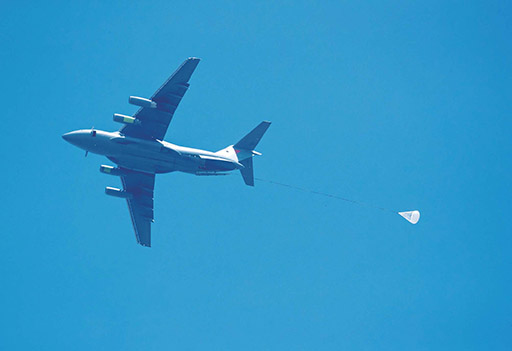

China’s largest domestically-developed transport aircraft Y-20 recently completed its first airborne jump and airdrop training together with airborne troops of the People’s Liberation Army Air Force, said the Aviation Industry Corporation of China (AVIC), Ltd. on its official micro-blog page on June 11.

The PLA Air Force's official micro-blog account had previously released similar news on May 8, and this post by AVIC is more like a confirmation. However, the photos released by the AVIC indicate that the aircraft has now conducted heavy equipment airdrop training, which was not concluded in the previous report.
Military experts say that heavy equipment airdrop tests are of great significance to the PLA airborne troops in improving their combat capability, since airborne troops are consistently a “trump card” in real battle.
The term “heavy equipment airdrop” refers to airdropping heavy weapons and equipment weighing over one ton. It’s essential for the remote maneuverability and fire assault capacity of modern airborne troops.
The Y-20 is able to airdrop an eight-plus-ton ZBD-03 airborne armored infantry fighting vehicle (IFV). The aircraft is designed to carry multiple airborne combat vehicles and airdrop heavy-load equipment. However, further drills are needed to test such capability.
 Fire brigade in Shanghai holds group wedding
Fire brigade in Shanghai holds group wedding Tourists enjoy ice sculptures in Datan Town, north China
Tourists enjoy ice sculptures in Datan Town, north China Sunset scenery of Dayan Pagoda in Xi'an
Sunset scenery of Dayan Pagoda in Xi'an Tourists have fun at scenic spot in Nanlong Town, NW China
Tourists have fun at scenic spot in Nanlong Town, NW China Harbin attracts tourists by making best use of ice in winter
Harbin attracts tourists by making best use of ice in winter In pics: FIS Alpine Ski Women's World Cup Slalom
In pics: FIS Alpine Ski Women's World Cup Slalom Black-necked cranes rest at reservoir in Lhunzhub County, Lhasa
Black-necked cranes rest at reservoir in Lhunzhub County, Lhasa China's FAST telescope will be available to foreign scientists in April
China's FAST telescope will be available to foreign scientists in April "She power" plays indispensable role in poverty alleviation
"She power" plays indispensable role in poverty alleviation Top 10 world news events of People's Daily in 2020
Top 10 world news events of People's Daily in 2020 Top 10 China news events of People's Daily in 2020
Top 10 China news events of People's Daily in 2020 Top 10 media buzzwords of 2020
Top 10 media buzzwords of 2020 Year-ender:10 major tourism stories of 2020
Year-ender:10 major tourism stories of 2020 No interference in Venezuelan issues
No interference in Venezuelan issues
 Biz prepares for trade spat
Biz prepares for trade spat
 Broadcasting Continent
Broadcasting Continent Australia wins Chinese CEOs as US loses
Australia wins Chinese CEOs as US loses